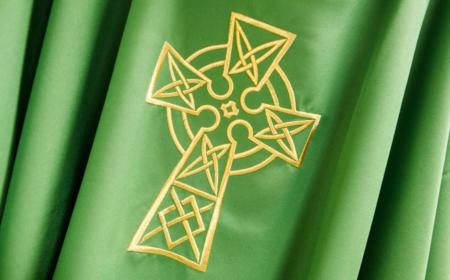'Ordinary Time is anything but ordinary'
The gifts are all unwrapped. The lights are all turned off. The tinsel and trappings are all put away. Another Christmas season is past.
This coming Sunday, all around the world, the Church begins a new liturgical season -- Ordinary Time.
"Ordinary Time is anything but ordinary," explained Father James Briody, professor at St. John's Seminary in Brighton.
He noted that the Christmas season ends with two very important feasts -- the Epiphany and the Baptism of the Lord, "which are great feasts that impress the revelation of our Lord to the world," he said. "In the Epiphany, he is revealed as the Messiah for all the nations; and in the Baptism of the Lord, the Father himself reveals that Jesus is, in fact, the Messiah."
Ordinary Time begins with another Gospel that reveals Jesus as the Messiah: the wedding feast at Cana, he continued. Not only was it Jesus' first public miracle, but when Jesus changes jars of water into wine, he fulfills the Messianic promise found in the book of Amos which said that "wine would flow in abundance" at the coming of the Messiah.
"This is the way we begin this season," he said, noting that during Ordinary Time, the Church "celebrates the mysteries of Christ in all its aspects."
"In Advent and Christmas, the Church focuses on Jesus' Incarnation and on the Second Coming. In Lent and Easter, the Church focuses on Christ's Passion, Death and Resurrection," he said. "But in Ordinary Time, we really get a chance to focus on his life in its entirety."
According to Father Briody, the term "ordinary" refers to "ordinal," as in the sequential numbering of the Sundays. He also noted that the season is divided into two parts -- the first portion beginning the Monday after the feast of the Baptism of the Lord and continuing until Ash Wednesday. The second portion begins the day after Pentecost and continues until the first Sunday of Advent.
Father Briody explained that before the Second Vatican Council, this season was not given a proper name. "They were simply called the Sundays after Epiphany and then the Sundays after Pentecost," he said.
After the Second Vatican Council, he continued, when "great emphasis was placed on restoring the Liturgical Year, the Church created Ordinary Time as a time to celebrate the saving works of Christ."
"It could be misconstrued that it's something plain, mundane and ordinary, but it really is not so," he stressed. "The resurrection of Christ has changed all that. Time is itself lifted up and transfigured by Christ."
"Time doesn't run on and on into death, it is transformed into eternal life," he continued. "Ordinary Time reminds us that even when our lives seem routine, our 'ordinary time' is extraordinary in the Lord."
He noted that the color worn by the clergy during Ordinary Time is green -- a color which symbolizes hope, life and growth.
"It's in the 'ordinary time' that we mature gradually," added Father Briody. "And so, Ordinary Time is not so ordinary after all. It's a time of holiness where we can live our lives and grow in faith and holiness."



















